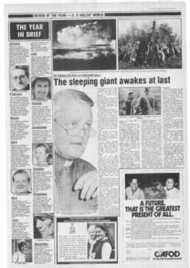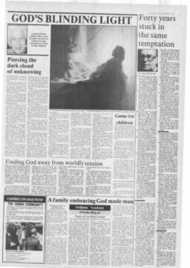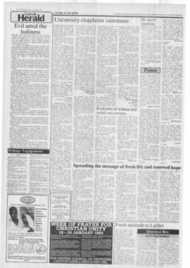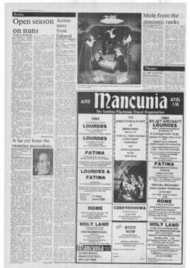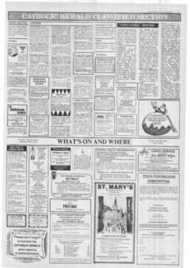Page 5, 23rd December 1983
Page 5
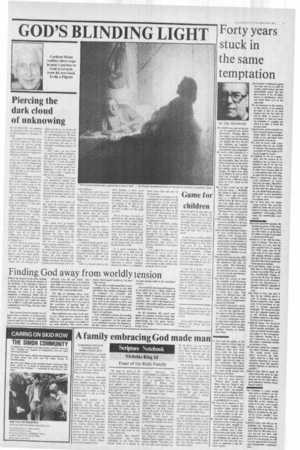
Report an error
Noticed an error on this page?If you've noticed an error in this article please click here to report it.
Tags
Share
Related articles
Does Nuclear 'security' Cut Out The Spiritual?
The Lesson Is Simple: 'love Your Enemy'
Caught In The Firing Line
When Deterrence Is Deferrence
The Day Dennis And Ian Said No To My Visits
In This Extract From His New Book Abbot Christopher Jamison
Forty years stuck in the same temptation
by Tim Beaumont
WE HAVE just entered the season of goodwill and nuclear destruction. Perhaps that is too crude a way of expressing it but I find it both distressing and helpful the way the. two are building up together. (Helpful because the contrast concentrates ones judgement.)
Of course, with Christmas it is the seasonal round. Catalogues started coming in during September, then the Post Office reminded us that October the first was the last day for sending cards to WaggaWagga, the lights have gone up in Regent St and in Sheffield last weekend a carol wafted from a different shop front In every street in the City centre.
But if you turned up the hill from the shops — Sheffield, like Rome is built on Seven Hills; there the similarity ends — a different sound seeped from the basement of The City Hall where every halfhour bombs went off and sirens wailed as excerpts from 'The Day After' were screened for those who wished to contemplate the unthinkable.
CND was having its AGM to crown an autumn of alarums and excursions and to prepare for a winter of discontent.
Inside the hall Mgr Bruce Kent's by now world-famous face radiated calm competence while at the rostrum delegates ranged from the reasonable to the hysterical as the movement confronted a range of difficult moral choices which confront every citizen (Christian or not) in the country.
They are of course no more difficult for the Christian than for the unbeliever but they are more public. The Christian's moral authority is embodied in a historical person, written down in a book and Interpreted by an institution.
The latter two sources at least are available to all Christians who need guidance and to all those who wish to criticise the Christians for the conclusions to which they come. And plenty of criticism there will undoubtedly be since there will be plenty of disagreement among the Faithful.
Last month I discussed a problem which confronts legislators — how far the majority has the right to bind the minority — a problem which concerns all of us in a democracy since we elect those legislators. But once laws are made we are then all confronted with another problem, whether we should obey them.
St Paul and the author of the First Epistle of Peter had no doubts on the subject. Civic obedience, they were clear, was a duty but they wrote before the days of the persecutions when the whole Church rapidly and bravely came to the conclusion that there were certain things you should not do, no matter how exalted the status of the person who told you to do them.
Jesus had, as so often, declined to give an easy answer. "Render unto Caesar the things that are Caesar's and render unto God the things that are God's "he blandly advised and his disciples have been trying to make the division (if it is a division and not a multiplicator) ever since.
The long list of martyrs of the Church (not to mention the mercifully rather shorter list of those martyred by the (:hurch) testifies to the cost of following one's conscience.
In Salvador and Nicaragua, as elsewhere in the world, priests and laymen daily struggle to do what they know to be their duty, realising that it may entail torture and death. Death may be the lot of all of us and for Christians the gateway to eternal life but that does not make us approach it any the more eagerly. And if death is ultimately a good the same can not be said for torture, which brings not only unspeakable agony but also the occasion of sin, the temp tation to incriminate others and hand them over to the same fate.
We are fortunate in this country in this century to be exposed (at least so far) to no such dangers but the fact that no one is likely to execute or assassinate us does not make the problem of working out when it is right to break the law any easier.
Indeed it may make it harder; we have to guard against an emo tional desire for martyrdom which is less prevalent when martyrdom costs more.
We start of course with a presumption that the law should
be obeyed. The reasons which convinced St Paul ought to be good enough for us too.
In addition we live in a democracy and the answer to re garding a law as unjust is to change it and if we can not persuade our fellow voters to do that there is some kind of
a presumption that they may be right and we may be wrong. Where a democracy does not work efficiently of course
there may be snags, The suffra gettes broke the law because the fact that they did not have
the vote denied them the democratic right to give themselves the vote — they were trapped in a vicious circle.
One of these days our unjust voting system may provoke others to break the law in the hope of forcing a reform. The arguments confronting CND today are considerably more urgent.
One such argument concerns the enormous gravity of the issues at stake. If you are fighting to save the world, or at the least 20 million lives how important is one measly little law?
Another is to do with the timescale of change. You may he convinced, as I am, that the next cyclical wave of support for CND, some time in the early Years of the next century will change Britain's policy but that will be little consolation if we have been wiped out in the nineteen-nineties.
Or if you believe, again as I do, that there is little danger of a nuclear war in the West at all but considerable danger of one in say 20 years in Africa or some area as yet undominafed by the superpowers, change in Britain's attitude in 20 years may be fairly irrelevant.
One thing is clear and that is that we are talking about a crisis of morals, an area of debate compared with which most of the problems we are used to become supremely irrelevant. We should be glad that our religious leaders are so far showing themselves extremely sensitive to the issues but they must remain so.
Cardinal Hume has declared that the creation of the deterrent is morally justifiable. Already a Catholic Herald reader has asked in the correspondence columns whether he is not condoning an entrance into (and a remaining within) an occasion of sin.
On the latter point the Cardinal was most laudably cautious. "To retain moral credibility, however, he said, "there must be a firm and effective intention to extract ourselves from the present fearful situation as quickly as possible."
Amen to that. But in nearly 40 years there has been no sign of any such extraction. How long can we live with such a pious intention without changing our stance?
The Cardinal is surely saying that such a position as our country is in now is only defensible if we intend to turn back. But, in fact, whether we notice it or not, every month brings a step forward. This year the birth of the Prince of Peace is heralded by the arrival of Cruise missiles. Next year by Trident? and the year after?
I doubt if next year will see me manning any barricades, or even approving the actions of those who do. But those of us who are not out there with them must be in here praying and if we are praying we will have no opportunity for harsh and uncharitable condemna-' firm.
blog comments powered by Disqus




